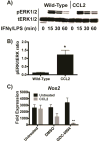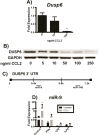Enhancement of macrophage inflammatory responses by CCL2 is correlated with increased miR-9 expression and downregulation of the ERK1/2 phosphatase Dusp6
- PMID: 28242024
- PMCID: PMC5425952
- DOI: 10.1016/j.cellimm.2017.02.005
Enhancement of macrophage inflammatory responses by CCL2 is correlated with increased miR-9 expression and downregulation of the ERK1/2 phosphatase Dusp6
Abstract
Macrophage polarization plays a central role in both protective immunity and immunopathology. While the role of cytokines in driving macrophage polarization is well characterized, less is understood about the role of chemokines. The purpose of this study was to determine if CC chemokine 2 (CCL2/MCP1) could influence macrophage polarization in response to subsequent activation with cytokines and microbial products. Treatment of bone marrow-derived macrophages with CCL2 alone did not result in increased expression of either classical or alternatively-activated macrophage genes as compared to standard skewing cytokines or Toll-like receptor agonists. However, subsequent stimulation of CCL2 pre-treated macrophages with classical activation stimuli resulted in enhanced expression of genes associated with classical activation. This enhancement correlated with increased phosphorylation of ERK1/2 kinases, a decrease in expression of the ERK phosphatase Dusp6 and enhanced expression of miR-9. These results indicate that CCL2 supports the classical activation of macrophages, with miR-9 mediated down-regulation of Dusp6 and enhanced ERK-mediated signal transduction possibly mediating this enhanced pro-inflammatory gene expression.
Keywords: Chemokines; Gene regulation; Macrophages; Micro-RNA; Signal transduction.
Copyright © 2017 Elsevier Inc. All rights reserved.
Figures







Comment in
-
Response to Letter by Mu et al.Cell Immunol. 2017 Dec;322:92. doi: 10.1016/j.cellimm.2017.10.012. Epub 2017 Oct 27. Cell Immunol. 2017. PMID: 29092753 No abstract available.
References
-
- Green RS, Stone EL, Tenno M, Lehtonen E, Farquhar MG, Marth JD. Mammalian N-glycan branching protects against innate immune self-recognition and inflammation in autoimmune disease pathogenesis. Immunity. 2007;27:308–320. - PubMed
Publication types
MeSH terms
Substances
Grants and funding
LinkOut - more resources
Full Text Sources
Other Literature Sources
Miscellaneous

